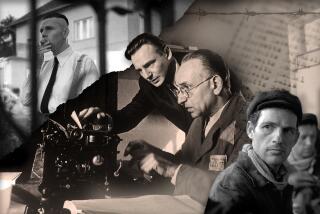Leopold Page; Fulfilled Vow to See ‘Schindler’s List’ Story Told
Leopold “Paul” Page, a Holocaust survivor whose unremitting determination to honor the German businessman who saved his life and those of 1,200 other Jews during World War II inspired the book and epic film “Schindler’s List,” has died.
A retired Beverly Hills retailer, Page died Friday at Cedars-Sinai Medical Center. He was 87.
Page’s achievement boils down to this: He had a story to tell, and Thomas Keneally needed a briefcase.
For four decades, Page cornered every writer who entered the leather-goods store and repair shop he owned on Beverly Drive and poured out the story of his rescuer, Oskar Schindler. Page believed that in a town that thrived on storytelling, surely someone would recognize the drama in the saga of a German industrialist who was a womanizer, a boozer and, by his reckoning, a saint among men in a world gone mad.
But years passed and Page’s dream went nowhere. Then, on a blistering day in October 1980, an Australian novelist walked into his store.
Keneally, an author who by then had more than a dozen novels to his credit, found a suitable replacement for his battered briefcase. But to his dismay, his Australian credit card took a long while to clear. Page, however, was thrilled.
“I have a great story for you,” he said.
Page, born Leopold Pfefferberg, had been a teacher with a master’s degree from Krakow University. When the war broke out, he became an officer in the Polish army, was wounded and captured, then escaped.
He nearly shot Schindler the first time they met. He had been hiding at his mother’s house in the ghetto of Krakow when Schindler, wearing a Nazi badge, came to hire his mother to redecorate his apartment. Deciding he was not an agent of the Gestapo, Page tucked his pistol in his belt and came out to help his mother negotiate. Schindler admired Page’s elegant blue shirt, acquired on the black market. Page agreed for a price to supply Schindler with similar goods.
Later, Page was rounded up and sent to a concentration camp at Plaszow that was run by SS Commander Amon Goeth, who was supplying Schindler with Jewish slave laborers in return for cash and gifts. Page worked as a welder in Goeth’s garage.
No. 173 on List of Schindler’s Workers
In 1944 Page became one of 900 Jews transferred to Schindler’s munitions plant in Brinnlitz. Schindler greeted all his Jewish workers there with hot soup and bread. He assured them they all would survive. Page worked there until the end of the war, sabotaging some of the shells made for the Nazis.
Bribing Nazi officials to let him take on more Jewish workers, Schindler drew up a list of about 1,200 Jews--he called them his children--and gave them work. Page was No. 173 on Schindler’s list.
True to Schindler’s promise, Page and his wife, Ludmilla, survived the war. Before leaving Europe for America in 1947, Page made a promise of his own.
“I did not know how I would do this,” he said, “but I promised Oskar Schindler I would make him a household name.”
At Ellis Island, he shed Pfefferberg for Page. He opened a small repair shop in New York before moving to Los Angeles in 1950.
Thirty-three years after making his vow to Schindler, Page had Keneally in his thrall. He led the writer to a back room and opened file drawers full of artifacts from his period in “paradise”: photos of Schindler, SS lists of Schindler’s workers, a transcript of a speech Schindler made on the factory floor of Brinnlitz at the end of the war.
Keneally delayed his return to Sydney and wound up spending the night at Page’s home, poring over papers and listening to Page recount the story of his savior. “I fell in love with this story in a way that is quite rare,” he recalled in People magazine several years ago.
Over the next months, Page introduced him to scores of Schindler’s “children.” Keneally’s fact-based novel, published in 1982, won England’s Booker Prize.
He wrote in the dedication to the book, “To the memory of Oskar Schindler, and to Leopold Pfefferberg, who by zeal and persistence caused this book to be written.”
Page later caused the movie to be made. Through a customer, he arranged a meeting with Steven Spielberg, fresh from the success of his movie “E.T.” Spielberg agreed to direct the movie based on Keneally’s book, but told Page it would take 10 years to reach the screen. That was not the answer Page wanted to hear. He badgered Spielberg in weekly phone calls. When the filmmaker was working on “Jurassic Park,” Page told him, “Stop playing around with dinosaurs. I promise you, you’ll get an Oscar for Oskar.”
“Schindler’s List,” released in 1993, won seven Oscars, including best picture.
“Were it not for Leopold Page, Oskar Schindler would only be known by those survivors of the Shoah whom he saved and by scholars and historians,” Spielberg said Monday. “As one of the Schindlerjuden, Paul Page persuaded author Thomas Keneally to write the book ‘Schindler’s List,’ and along with the film, created a beacon of tolerance for the whole world to see.”
After the book became an international bestseller, Schindler was criticized as an opportunist with flawed intentions. Page had no illusions about the businessman, but defended him to the end.
When Schindler’s businesses failed at the war’s end and he was blocked from entering the United States because of his Nazi Party membership, Page became his rescuer’s benefactor. He persuaded Jews who had been saved by him to donate a day’s earnings and took Schindler a check for $37,000.
Schindler died in 1974 and was buried, according to his wishes, in Israel.
In addition to his wife, Page is survived by a son, Fred, and a daughter, Marie Knecht, both of Los Angeles, and two grandchildren. Services will be held today at 1 p.m. at Hillside Memorial Park in Culver City.
More to Read
Sign up for our Book Club newsletter
Get the latest news, events and more from the Los Angeles Times Book Club, and help us get L.A. reading and talking.
You may occasionally receive promotional content from the Los Angeles Times.








